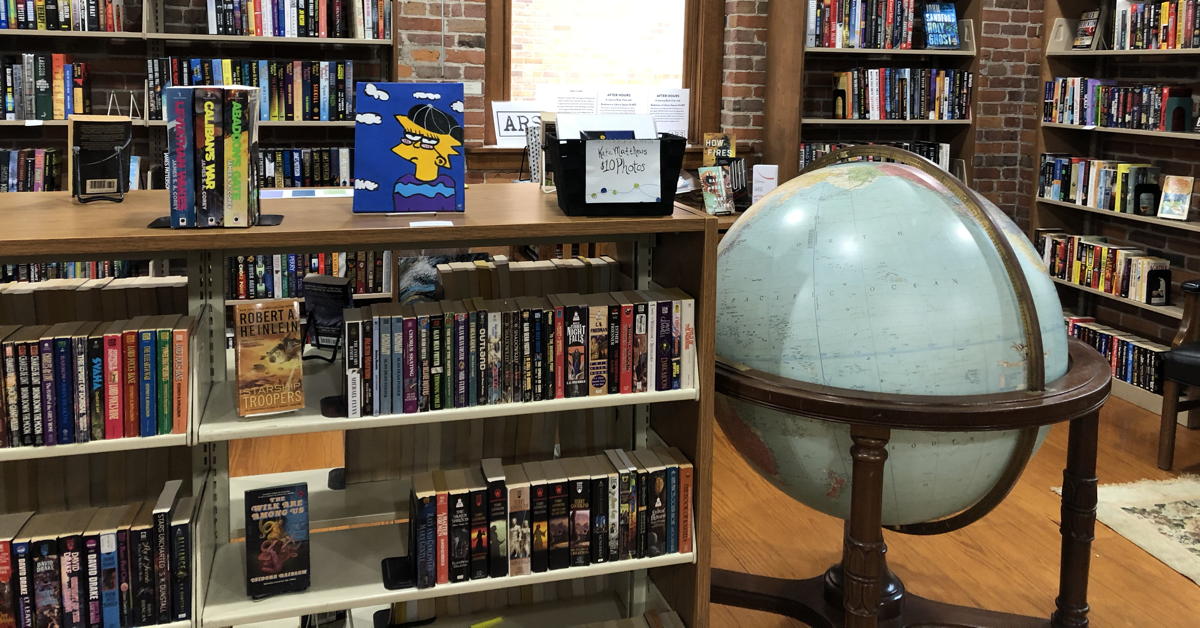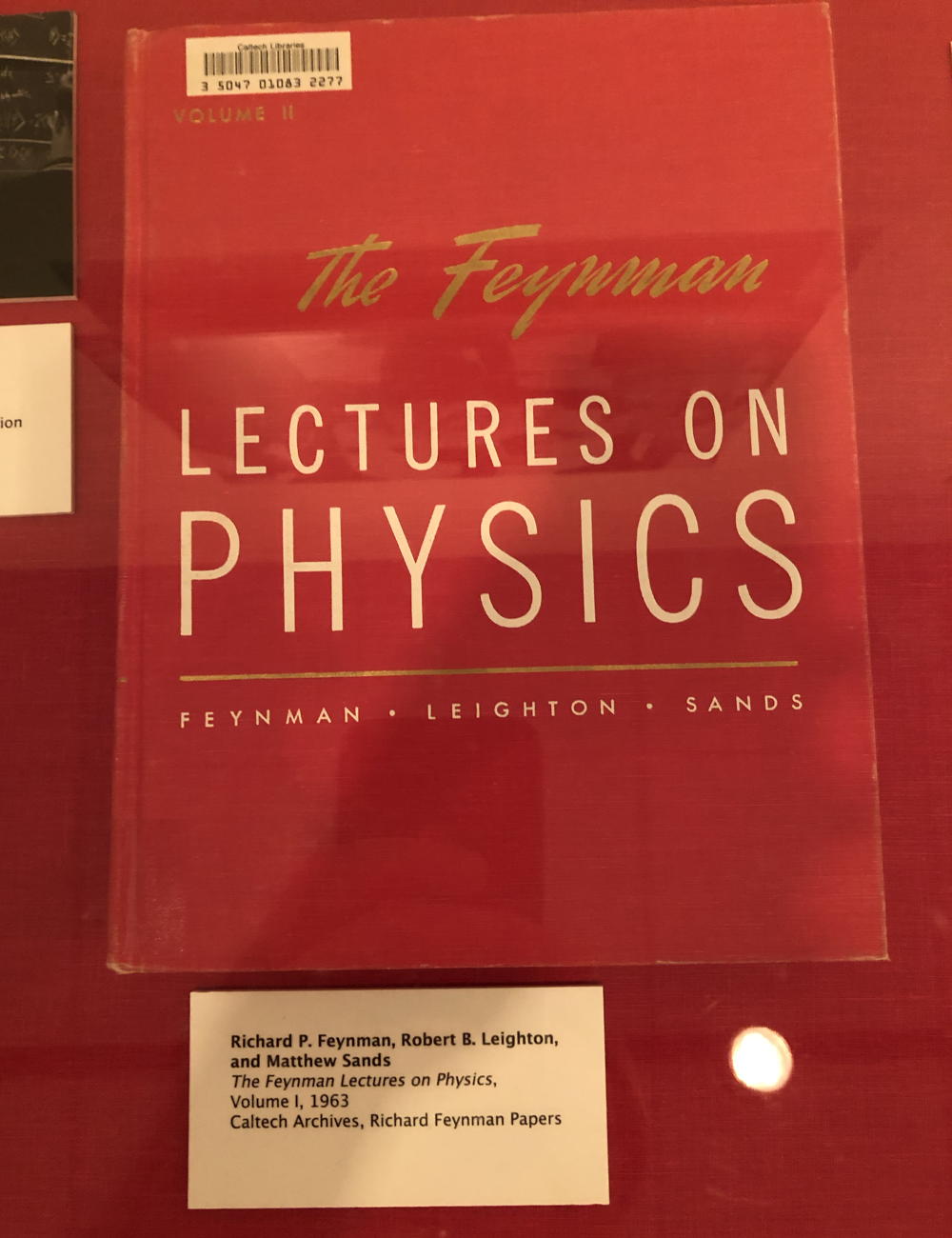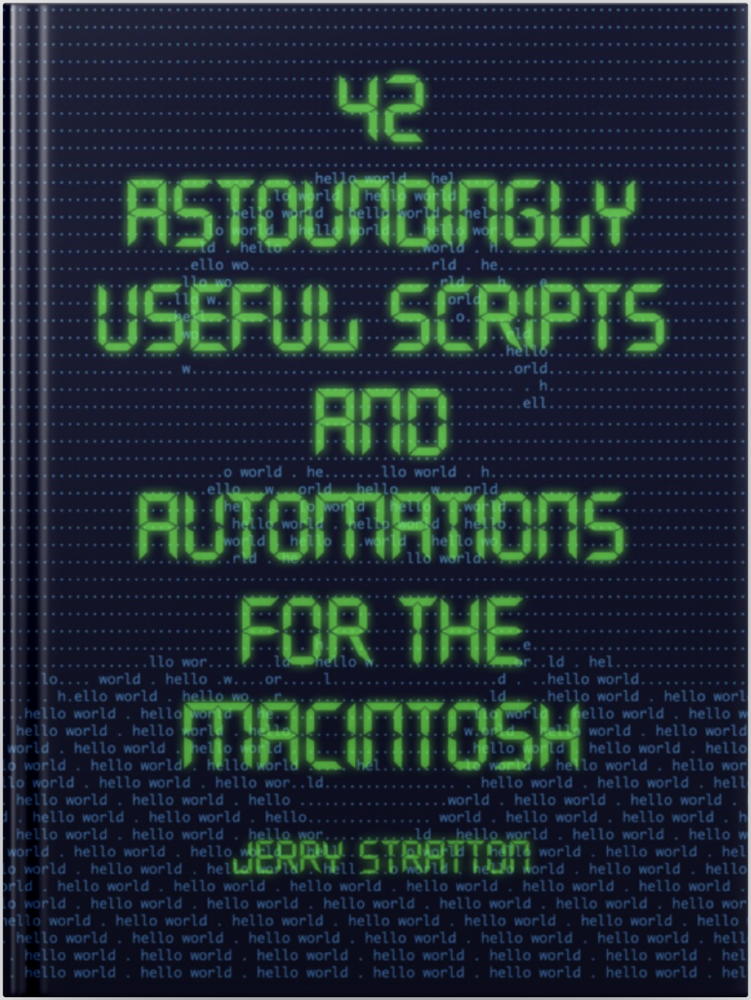The Year in Books: 2019

If you find yourself in Little Rock, the Bookstore at Library Square is a great place to browse and relax.
It has been a very good year for books, and I even made a dent in my to-read pile. According to my database, I acquired 136 books this year, and according to Goodreads I read 145.
Since my to-read pile is a double-wide bookcase, I should be through it in about twenty years.
The Goodreads “year in books” is an interesting summary, but some of its categories are antiquated. In the era of ebooks, I don’t know that “shortest book read” makes a lot of sense. The shortest book I read this year was, of course, a short story. It was a very good short story, Lauren Pope’s1 fun Just Another Oppressor. Sadly, as far as I can tell it’s no longer available.
The longest book was IBM’s Early Computers•, a fascinating look at the history of digital computers through the growth of a company that could have been destroyed by them. IBM was a mechanical device company. They made typewriters, and card readers, all mechanical devices for aiding in data collection and analysis. All of them destined for the junkyard. Had IBM not completely shifted their focus, they would have gone out of business.
The most popular book was a science fiction book, Dune. I read Dune ages ago, along with Dune Messiah, but never got around to finishing the trilogy. This year I vowed to read the full three books, and did so. It is not surprising that this science fiction book is incredibly popular and remains so. It touches on just about everything that it means to be human.
The least popular book I read varies, because I read several books that “0 people also read”. What that means, of course, is that zero people read them and then notified Goodreads. Currently in that slot is Instant BASIC•. It’s filled with public domain art and era-specific jokes
I continued reading a lot of late seventies/early eighties computer books this year, which meant a lot of BASIC. The very first book I finished in 2019 was 24 Tested Ready-to-Run Game Programs in BASIC.
In an homage to those old how-to books, I published my own book this year, 42 Astoundingly Useful Scripts and Automations for the Macintosh. If you own a Macintosh and you like making, you owe it to yourself to buy my book.
As part of immersing myself in the seventies computer scene, I also finally learned FORTRAN, with James S. Coan’s Basic FORTRAN. By the eighties, when I went to college, FORTRAN was an afterthought in our computer courses; we were assigned all of one program to write in FORTRAN, and it was simple enough it didn’t really require learning the language. Going over the language now, years later, it’s amazing both how much it must have influenced BASIC and how much of the language focussed on hardcopy output.
The most amazing book of the era, though, was Ruth Leavitt’s• Artist and Computer•. Like many of these books, it was put together and, in this case, published, just before the era of the home computer. Looking at what working artists did with computers then, and how they thought about computers, was fascinating.
I also built a Replica 1, which is a fascinating kit that comes as close as you can to replicating an Apple 1 using parts available today. If you’re interested in the history of personal computing, and you’ve ever soldered before, I highly recommend it.
The highest rated book I read this year is Up From Slavery•, and I fully agree with the Goodreads Cabal that this book is worth reading. It’s on my very short list of civic necessities. If you’re an American, you ought to read Up From Slavery•. Booker T. Washington• lived an amazing life, and his advice is timeless.
“It means a great deal,” he writes, “to start off on a foundation which one has made for one’s self.” And “I make it a rule never to let my work drive me, but to so master it, that I will be the master instead of the servant.”
The last book I read this year, I just added to this review. I like to get this post up on the first Wednesday of the new year, and this year that means the first day of the year. But it’s not quite New Year’s Eve yet, and I’ve finally read Frankenstein; or, The Modern Prometheus by Mary Shelley. The story is very unlike its modern retellings. It is very allegorical, and the creature itself is very unlike its modern depiction. It is a very well-spoken, very amoral creature, much like some of the people Mary Shelly knew.
I also cleared out two of the three ebook apps I have on my mobile devices. I realized a few months ago that I never go into either the Kindle app or the Nook app, so I decided to read the few books I’ve acquired in them. My experience is that neither app is as reader-friendly as Apple’s Books app, but the Nook is hands-down the worst.
Reading with the Kindle app was an okay experience. It is very close to the metal. It doesn’t think in pages at all, but in “locations”, which might make it easier to get to the same location on different devices, but locations seem to be more about telling me where I am than helping me get somewhere I want to be.
The Nook is horrible. It does use pages, but they don’t match the pages on the device. Flipping pages can mean that the page number goes up by more than one or not at all. Highlighting portions of the text is difficult at best. I ended up satisfying myself with highlighting whatever portions around the desired text that the software would allow. Getting my notes out is, as far as I can see, impossible, other than by using a screen shot.
Experiencing both of these made me lean very strongly toward avoiding buying an ebook on Kindle, and never buying one on Nook. I’ll be sticking to the Apple bookstore and to ePubs that can be brought into Books, such as books from archive.org, Gutenberg, or Smashwords.
I only added two books to my civic necessity shelf this year; the other was Mark Steyn’s The Face of the Tiger•. Steyn provides a unique look at how Americans responded to the September 11 attacks and how the world responded to Americans, written from his perspective as a Canadian immigrant who maintains citizenship in two worlds, New Hampshire and Quebec, and who often travels to London and Europe. He’s able to clearly describe the difference between the American and European worldview, and how that affects our misunderstandings. He wrote these essays in the year following September 11, 2001, and it was fascinating reading them now, nearly twenty years later.

Caltech had a nice exhibit about Richard Feynman in May, and highlighted one of his books.
I created a new shelf to correspond scientific literacy to civic necessity, scientific necessity. I was inspired to do so by Kip Thorne’s Black Holes and Time Warps•. If you’re interested in the science of black holes and relativity, or if you’re interested in seeing how science progresses, I cannot recommend this book highly enough.
Of course, I retroactively added Richard Feynman to the scientific necessity shelf.
Each year I add one book to my eleven bookshelf, for books that, if Goodreads had a 1-10 scale, I would rate them 11. This year’s is Victor E. Frankl’s Man’s Search for Meaning•. This is the first time that I’ve added a non-novel to the shelf. Frankl’s book is both a memoir of the concentration camp, and a theory of how the search for meaning is a primal urge, like hunger and sex.
That search for purpose is important is not new; that its lack is a major problem today is something I’ve been thinking about for a while. There is probably no place in recent or even modern history where the search for meaning would be more difficult than in the Nazi concentration camps. But Frankl finds it there.
Our generation is realistic, for we have come to know man as he really is. After all, man is that being who invented the gas chambers of Auschwitz; however, he is also that being who entered those gas chambers upright, with the Lord’s Prayer or the Shema Yisrael on his lips. — Victor E. Frankl (Man’s Search for Meaning•)
In response to The Case for Books in 2015: In 2015, I read a lot of books… and bought a lot more. That’s not a sustainable market plan.
No, not that one.
↑
Astounding Scripts
- 42 Astoundingly Useful Scripts and Automations for the Macintosh
- MacOS uses Perl, Python, AppleScript, and Automator and you can write scripts in all of these. Build a talking alarm. Roll dice. Preflight your social media comments. Play music and create ASCII art. Get your retro on and bring your Macintosh into the world of tomorrow with 42 Astoundingly Useful Scripts and Automations for the Macintosh!
bookstores
- Friends of the New Braunfels Public Library Annual Book Sale
- The annual New Braunfels Library sale is well worth a visit if you live nearby.
- New Orleans: Beckham’s Bookshop
- Beckham’s Bookshop is a musty must-stop if you’re in the French Quarter.
civilization
- Civic necessity bookshelf: Jerry Stratton at Jerry@Goodreads
- I highly recommend these books on how our political process works, how it should work, and how it came to be.
- The Face of the Tiger•: Mark Steyn
-
 Mark Steyn’s columns from just before September 11 to a year later. It’s an insightful look at how Americans responded to the September 11 attacks and how the world responded to Americans, written by a Canadian immigrant who maintains citizenship in two worlds, New Hampshire and Quebec.
Mark Steyn’s columns from just before September 11 to a year later. It’s an insightful look at how Americans responded to the September 11 attacks and how the world responded to Americans, written by a Canadian immigrant who maintains citizenship in two worlds, New Hampshire and Quebec.
- Man’s Search for Meaning•: Viktor E. Frankl (paperback)
-
 If man’s search for meaning is a primal urge, much of modern psychiatry and social politics is counter-productive.
If man’s search for meaning is a primal urge, much of modern psychiatry and social politics is counter-productive.
- No way for a man to live: suicide and the bureaucratic state
- Is male (and military) suicide caused by the stranglehold of the bureaucratic state?
- Up From Slavery•: Booker T. Washington (paperback)
- Booker T. Washington was born a slave, educated himself, and helped found a great university.
computer history
- Artist and Computer•: Ruth Leavitt (paperback)
- “No computer will ever take the place of an artist. But many artists are discovering computers as a medium to create finished pieces of art, while others explore new art forms, using the computer as an idea machine.”
- Building the Replica 1 Plus Apple 1 kit
- The Apple 1 kit from Briel/ReactiveMicro is an amazing piece of history, and a lot of fun.
- IBM’s Early Computers•: Charles J. Bashe, Lyle R. Johnson, John H. Palmer, and Emerson W. Pugh (hardcover)
- A fascinating case study of a company shifting to a completely new technology in order to maintain dominance in an industry.
- Instant BASIC•: Jerald R. Brown (paperback)
- A great introduction to old-school BASIC.
Goodreads
- Books that go to eleven: Jerry Stratton at Jerry@Goodreads
- Yes, but this one goes to eleven.
- Goodreads: Year in Books 2019 at Jerry@Goodreads
- I read 32,530 pages across 138 books. When you put it that way, it sounds like work. It wasn’t.
science
- Black Holes and Time Warps: Einstein’s Outrageous Legacy•: Kip S. Thorne (paperback)
-
 Despite being written over almost exactly a quarter century ago, this is still a highly informative book. It is both a description of the then-current state of black hole and singularity theories but also a history of how scientists had arrived at that point; and a highly accurate prediction of what would be discovered “in the early 2000s”.
Despite being written over almost exactly a quarter century ago, this is still a highly informative book. It is both a description of the then-current state of black hole and singularity theories but also a history of how scientists had arrived at that point; and a highly accurate prediction of what would be discovered “in the early 2000s”.
- Scientific necessity bookshelf: Jerry Stratton at Jerry@Goodreads
- These are very readable books that describe clearly what it means to do science.
More 2019
- 2019 in Photos
- For photos, memes, and perhaps other quick notes sent from my mobile device or written on the fly during 2019.
More annual retrospectives
- My year in food: 2022
- From New Year to Christmas, from ice cream to casseroles, from San Diego to New Orleans, from 1893 to 2014… and beyond!
- My Year in Books: 2022
- From Hoplites to Venice… California, this has been a year in books filled with war, evil, and the dehumanization of man. But it’s also been a year of high adventure, magic, and larger-than-life heroes.
- My Year in Food: 2021
- From Washington DC to San Diego and one or two places in between, it’s been a very good year for food.
- My Year in Books: 2021
- From Louis l’Amour to slavery to H. Rider Haggard, it’s been a very good year in books.
- The Year in Books: 2020
- What did 2020 have to offer in books?
- One more page with the topic annual retrospectives, and other related pages
More books
- My Year in Books: 2024
- This has been a wonderful year in books, especially for revisiting old classics and visiting some old classics for the first time.
- My Year in Books: 2023
- It’s been a slower year in books than previous ones, but it was still a year of fantasy in the past, in the future, and across time, as well as an unplanned foray into people doing the impossible and changing the world.
- My Year in Books: 2022
- From Hoplites to Venice… California, this has been a year in books filled with war, evil, and the dehumanization of man. But it’s also been a year of high adventure, magic, and larger-than-life heroes.
- My Year in Books: 2021
- From Louis l’Amour to slavery to H. Rider Haggard, it’s been a very good year in books.
- The Year in Books: 2020
- What did 2020 have to offer in books?
- Two more pages with the topic books, and other related pages


